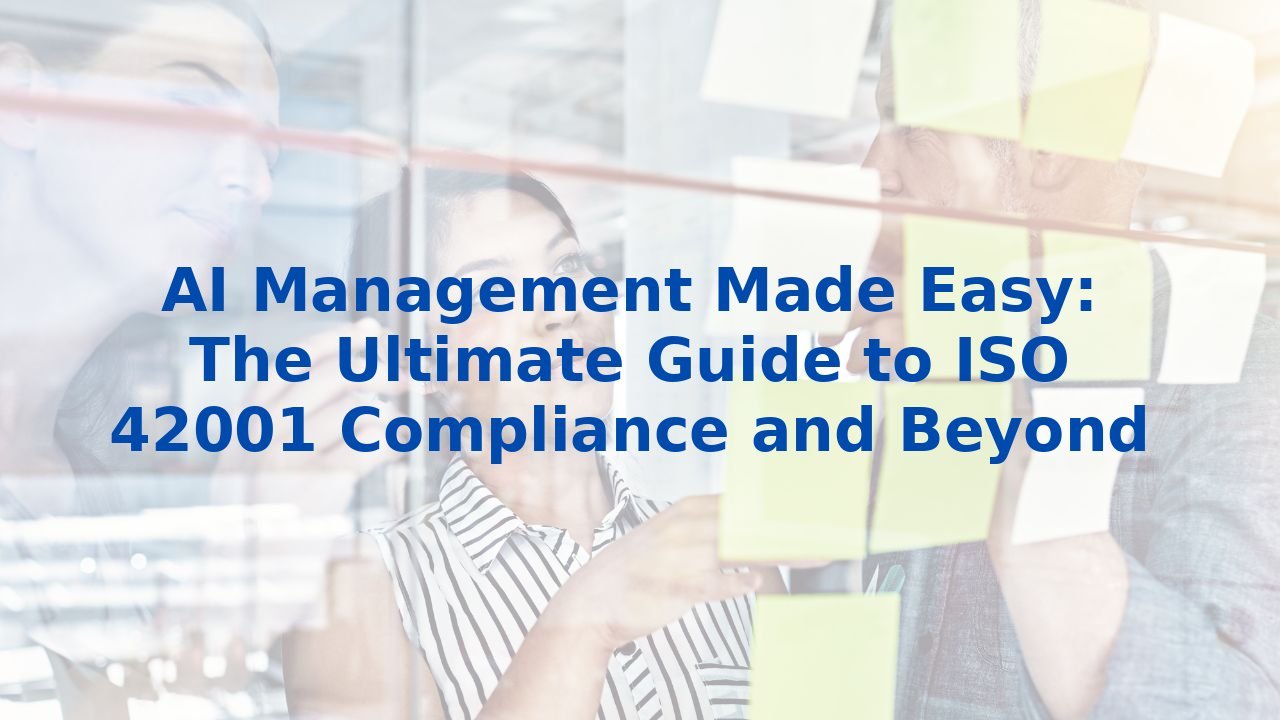AI Management Made Easy: The Ultimate Guide to ISO 42001 Compliance and Beyond
AI Management Made Easy: The Ultimate Guide to ISO 42001 Compliance and Beyond
As the landscape of artificial intelligence (AI) continues to evolve, organizations must grapple with the implications and opportunities that come with it. Integrating AI into your business processes is not just a luxury; it’s a necessity for sustained growth and compliance, especially in light of standards like ISO 42001. This guide will explore how AI can enhance your general business processes while significantly improving organizational efficiency.
The Transformative Power of AI in Business Processes
AI is not merely an add-on; it’s a transformative force that reshapes how businesses operate. From optimizing decision-making to revolutionizing customer interactions, the influence of AI is pervasive. Let’s explore a few key areas:
1. Data Analysis and Decision-Making
AI excels at analyzing massive datasets and extracting actionable insights, often overlooked by human analysts. This capability allows organizations to make informed decisions, optimize their operations, and anticipate market trends with unprecedented accuracy.
2. Customer Service
Imagine a world where customer inquiries are addressed instantly, 24/7. AI-powered chatbots do just that, significantly enhancing customer satisfaction while reducing the workload on human representatives. Businesses that leverage this technology can not only provide better service but also stay ahead of competition.
3. Marketing and Advertising
With AI-driven marketing tools, businesses can analyze consumer behaviors and preferences to tailor personalized marketing campaigns. This level of insight maximizes ROI and minimizes wasted ad spend, all while enhancing engagement with potential customers.
4. Supply Chain Management
In supply chain logistics, AI can predict demand, optimize inventory levels, and streamline operations. This predictive capability ensures businesses are agile and responsive to market fluctuations, significantly reducing costs associated with excess inventory.
5. Compliance and Risk Management
In an era where regulations continue to evolve, AI offers unparalleled support in monitoring compliance. By analyzing data for potential risks, AI can help organizations ensure they meet legal requirements, effectively safeguarding against penalties and reputational damage.
Benefits of Improving Efficiency with AI
The introduction of AI into business operations doesn't just modernize processes; it also drives efficiency through several key mechanisms:
1. Automation
AI excels at automating repetitive tasks, allowing human resources to focus on strategic initiatives. This not only enhances productivity but also fosters innovation as employees can dedicate their time to problem-solving and creative thinking.
2. Scalability
AI systems are designed to easily manage increased data and operational demands without a corresponding spike in costs. This scalability is a game changer for businesses preparing for growth.
3. Accuracy
By minimizing human error, AI-driven systems enhance both the speed and precision of various processes. From data entry to advanced analytics, the accuracy of AI algorithms leads to smarter decisions.
4. Innovation
AI fosters an environment ripe for innovation. By providing tools and insights that facilitate experimentation, organizations are empowered to explore new business models and solutions that can set them apart from the competition.
Empowering Employees Through AI Training
The synergy between humans and AI is essential for maximizing efficiency. Employee training in AI is not just beneficial; it’s vital. Here are some compelling reasons to invest in training your workforce:
1. Enhanced Collaboration
Employees trained in AI can better integrate these technologies into their daily tasks, driving collaboration between human intuition and machine learning.
2. Improved Decision-Making
Understanding AI equips employees with the tools to leverage AI insights effectively, enhancing their decision-making capabilities. This blend of human and machine intelligence fosters a proactive culture of informed choices.
3. Adaptability
As the landscape of AI continues to evolve, a well-trained workforce is agile and ready to embrace new advancements, ensuring seamless integration into existing workflows.
4. Competitive Advantage
Investing in employee training provides organizations with a distinct edge. Teams that understand and utilize AI effectively are better positioned to innovate and lead in their fields.
Conclusion
In conclusion, AI stands poised to redefine how businesses operate. From enhancing data analysis and decision-making to optimizing customer interactions, the potential benefits are extensive. However, to unlock these advantages, organizations must not only implement AI technologies but also invest in the training of their employees to work effectively alongside these systems. As we approach new regulations like the EU AI Act, proactive compliance through strategies such as ISO 42001 becomes imperative. The journey towards AI integration may be complex, but the rewards—efficiency, accuracy, and innovation—are undoubtedly worth the effort.
For those ready to embark on this transformative journey, consider exploring comprehensive training options that equip your entire workforce with AI skills. Dive into tailored solutions that align with your organizational needs and unlock the full potential of artificial intelligence in your operations.



